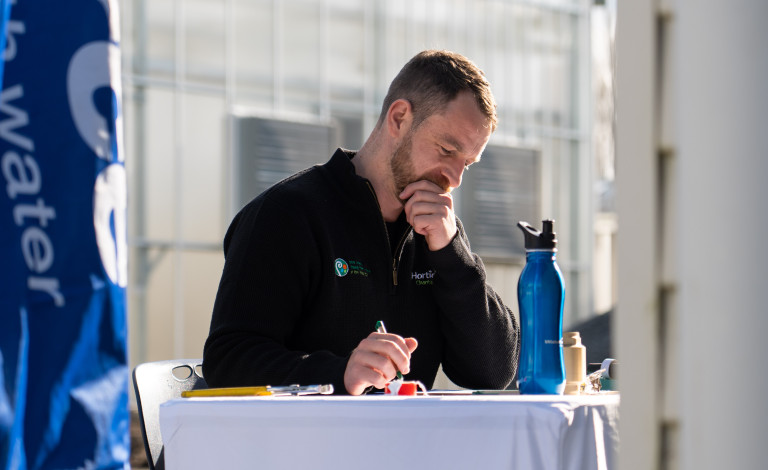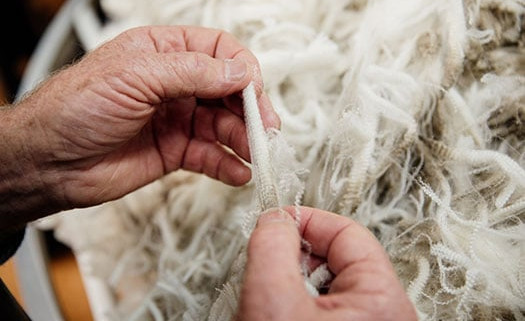Showcasing career opportunities in the agri sector
28 April 2023 | News
Lincoln University recently hosted 20 high school students from across the South Island for a four-day educational camp that showcased career pathways in the food production supply chain.
Held last week, the Rabobank FoodX Programme was attended by students from 11 high schools across the Canterbury, Otago and West Coast regions.
The programme took in visits to a range of agribusiness operations across the Canterbury region including sheep and beef, cropping and dairy farms, Food and Arable Research (FAR), Fonterra, Lincoln New World, Oakley’s Premium Fresh Vegetables and the New Zealand Merino company.
This was the second Rabobank FoodX to be held, with the inaugural programme having taken place in 2019. The initial idea for the programme was developed by the Rabobank Upper South Island Client Council – a group of Rabobank clients who work with the bank to address key agricultural industry challenges – after they identified a need for more promotion of agri industry careers among secondary school students.
Both the 2019 FoodX event and this year’s programme were run in conjunction with Te Whare Wānaka o Aoraki Lincoln University, due to its land-based credentials.
Rabobank Upper South Island Client Council Chair Robin Oakley said attracting high calibre young people into agri careers was an on-going challenge for the sector.
"The Client Council identified improved promotion of agri careers as one of its key focus areas way back in 2012 when the group was first set up. And we’ve been working closely alongside Lincoln University for a number of years to shine a light on the array of employment opportunities within the sector," he said.
"The first Rabobank FoodX received some fantastic feedback from attendees, and it was great to get the programme back up and running this year after an extended break due to Covid.
"It was also really rewarding to have the students visit my own vegetable-growing business (Oakley’s Premium Fresh Vegetables) and to tell them a bit more about what we do and who we sell our produce to."
Programme participant Lily Saunders, a year 12 student from Christchurch Girls’ High School, said she went into the programme with very limited knowledge of the agricultural industry.

Lily Saunders (right) with fellow programme participant, Nora Paicu (of Columba College) at Lincoln University during the four-day FoodX camp.
"I’m from Christchurch and I’m very much a townie," she said. "My aunty and uncle from Palmerston North do own a farm, but I don’t really know much about it and, if I’m honest, I went into the programme with a bit of a negative perception of the industry due to some of the stories I’d seen in the media.
"While this was the case, I saw some information promoting the programme and thought it might be a good chance to find out more, so I emailed my career adviser and after discussion with her, I decided to sign up."
Lily said her experiences at FoodX had completely changed her perception of the industry, and she was now seriously considering a career in the sector.
I went into the week thinking I’d study environmental science once I finish up at school, but I’ve come away thinking I’d now like to do a Bachelor of Agricultural Science at Lincoln University.
She was surprised by the large size of the sector and "really impressed by all the things farmers and the others working in the industry are doing to create a more sustainable food production system".
"I thoroughly enjoyed learning more about what happens on farm and, in particular, how farmers look after their soil by using fertiliser and rotating crops. I also thought it was really cool looking inside some of the big agribusiness operations like Fonterra and NZ Merino Company and seeing how they use some pretty sophisticated automation to do different jobs.
Lily said the vast number of opportunities within the agribusiness sector, as well as the variety of tasks within individual agri roles, were further factors which had moved her towards consideration of an agri career.
"We heard from a bunch of people across the week who all had different roles, and a lot of them talked about how they spend time in their job out on farm getting their hands dirty, as well as time in the office," she said.
"And this mix of different tasks within the one role is something that really appeals to me."
Lincoln University Domestic Liaison Team Leader Lucy Grubb led the four-day programme and said, like Lily, many of the students were surprised by the range of jobs connected to the sector.
"Coming into the programme, a lot of the students associated roles in the agribusiness sector with on-farm positions, but they didn’t necessarily have a good grasp of all the other positions that are linked into the sector," she said.
"So it was a bit of an eye opener for some of them to learn about all the potential career paths connected to the sector in areas like marketing, research and development and logistics."
Ms Grubb said the FoodX programme was one of a host of initiatives now being targeted at secondary school students, with the aim of improving understanding of the agribusiness sector and the career opportunities within it.
"Going back just 10 years, there weren’t many schools offering agribusiness as a study option. But initiatives like FoodX and the Agribusiness in Schools programme have helped change all this, and agribusiness is now much more prominent in secondary schools around the country,” she said.
"This has led to greater numbers of students looking to undertake tertiary education in the agribusiness arena, and we’ve seen this here at Lincoln University with student numbers up strongly on recent years."
The FoodX programme participants had a great time at the Lincoln campus.


